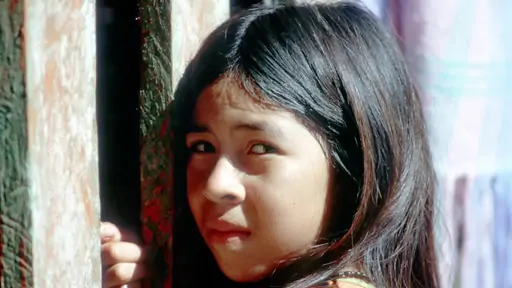Indigenous Calendar December, 2011: Hosted by Ecuador's Amazonian Huaorani People

The Huaorani people live mainly in Ecuador but also in neighboring Peru. They are among the most recent of any indigenous peoples to have contact with the outside world. That contact has not been without suffering, political controversy and even killing.
The first contact took place in the late 1940's. That contact, initiated by the Dutch energy company, Shell, for the purpose of exploratory oil drilling was quickly abandoned after everyone involved had underestimated the resistance that the Huaorani would present. It would be almost another ten years before Christian missionaries and linguists would attempt a second contact. The Huaorani killed five of them.
It wasn't until the late 1960's that the Huaorani had mass contact with the outside world. That contact took place as they were relocated away from their traditional land so that the oil company Texaco could drill for the oil first sought twenty years earlier. Some Huaorani resisted the relocation and instead chose to move further into the Amazon to avoid contact. They still live there today.
I'd already visited many Quichua communities in Ecuador and now I decided to visit a Huaorani village. I was in the small town of Coca. My prior research had uncovered mixed reviews of local tour guides. I had also found out that only about ten years earlier Huaorani elders had banned tourism into this part of Ecuador. I walked around the town and met a handful of guides. Although they were offering tours into Huaorani territory few included visiting Huaorani communities and then only for an hour or so. Even this was going to be very expensive unless I could find other travelers to join me. In any case it would not suit my purpose, which was to spend as much time as possible with the Huaorani — staying overnight in a community if possible.
I was about to give up when I got talking to a young Huaorani man in a local café. He had lived in Coca for a few years but he told me about the small village he came from. After informing him of my plans I was building up to asking him if he would be willing to take me into his village. Then he unexpectedly told me "just go there — on your own." Given the recent history of the region and contact with outsiders I didn't think that was such a good idea; it might even be dangerous. After further discussion he assured me that his village was used to outsiders, that I would be able to converse with everyone in Spanish and that if I asked for one of the village elders and mentioned his name I would be safe. The next day I set out with a three-day supply of food for his village. It was too far away to allow a return trip that same day. I was, of course, apprehensive.
As I approached the village late that afternoon a few adult men were gathered and appeared to be passing time in conversation. They noticed me and looked at me stupefied — which didn't help my apprehension. I mentioned my 'friend' from Coca, showed them my food supply and asked to speak to a village elder about the possibility of staying a night or two in the village. They appeared to recognize my 'friend's' name but still looked dubious about someone, a "gringo," who had come all this way alone. I was beginning to think that I would have to sleep alone in the jungle that night and head back to Coca the next day.
One of the men signaled for me to follow him into the village. He introduced me to another man, perhaps in his sixties, whom I assumed to be one of the elders, and abruptly left us alone. Again I explained the circumstances of my strange arrival. I even started to see an aspect of comedy in the whole situation (but I avoided breaking into laughter). He told me I could stay with his family.
My hosts could not have been more welcoming during my stay. They showed me around the village and taught me a lot about the history, traditions and beliefs of their people. They were as inquisitive about me as I was about them. I noticed this young girl observing me often during my stay. I learned that only two generations ago Huaorani children of her age were expected to be already self-sufficient — hunting and gathering their own food! I remember wondering whether she might have distant, un-contacted cousins of the same age, somewhere deep in the jungle, who still hunt and gather their food; the probability of that is quite high. And I remember not being able to decide whether she or they have the better quality of life.
If you enjoyed reading this article, please consider supporting independent, advertising-free journalism by buying us a coffee to help us cover the cost of hosting our web site. Please click on the link or scan the QR code. Thanks!


